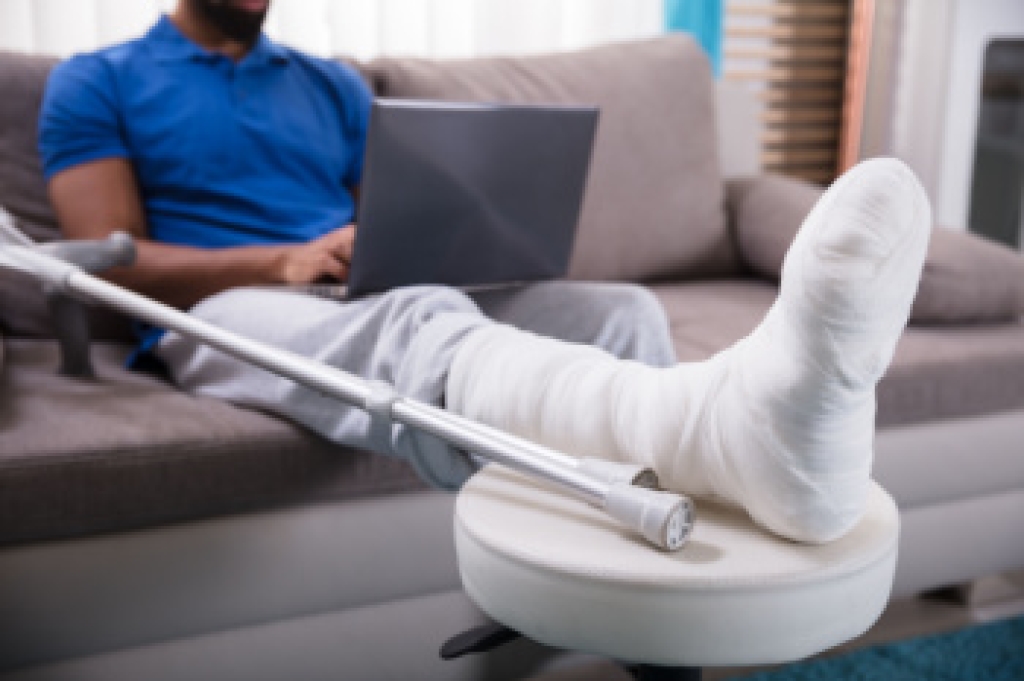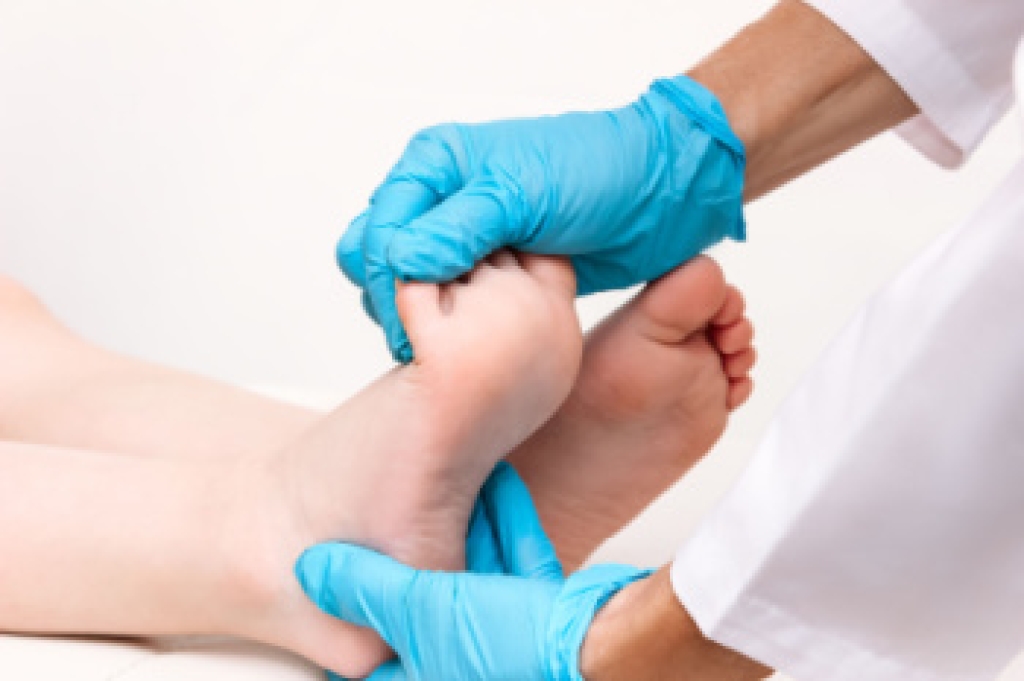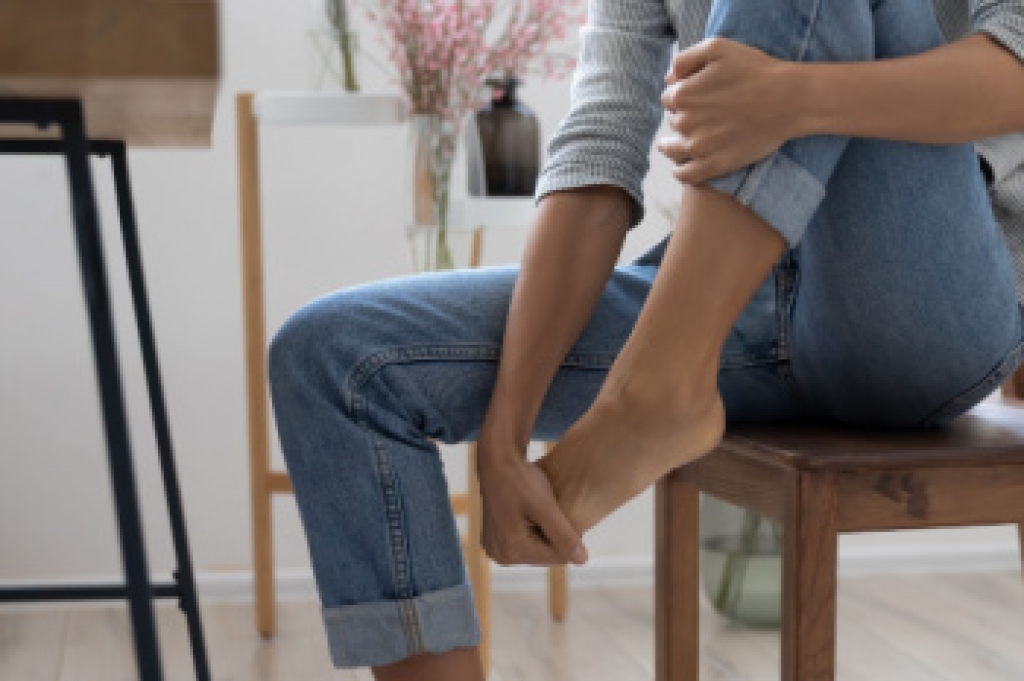Blog
Care for Foot Fractures That Affect the Joints

Fractures that extend into the joints of the foot require careful and timely treatment to protect long-term mobility. These injuries can damage cartilage, disrupt joint alignment, and lead to persistent pain, if not managed appropriately. A podiatrist will assess the location and severity of the fracture, often using imaging to determine the best approach. Treatment may involve immobilization, use of supportive devices, or surgical repair to restore joint stability. Early rehabilitation is important to maintain range of motion and reduce stiffness. Without proper care, there is a higher risk of post-traumatic arthritis and chronic discomfort. Monitoring recovery closely helps ensure proper healing and reduces the chance of future complications. If you experience a foot injury with swelling, pain, or difficulty bearing weight, it is suggested you seek evaluation from a podiatrist.
A broken foot requires immediate medical attention and treatment. If you need your feet checked, contact Gary Saphire, DPM from Parkway Podiatry. Our doctor can provide the care you need to keep you pain-free and on your feet.
Broken Foot Causes, Symptoms, and Treatment
A broken foot is caused by one of the bones in the foot typically breaking when bended, crushed, or stretched beyond its natural capabilities. Usually the location of the fracture indicates how the break occurred, whether it was through an object, fall, or any other type of injury.
Common Symptoms of Broken Feet:
- Bruising
- Pain
- Redness
- Swelling
- Blue in color
- Numbness
- Cold
- Misshapen
- Cuts
- Deformities
Those that suspect they have a broken foot shoot seek urgent medical attention where a medical professional could diagnose the severity.
Treatment for broken bones varies depending on the cause, severity and location. Some will require the use of splints, casts or crutches while others could even involve surgery to repair the broken bones. Personal care includes the use of ice and keeping the foot stabilized and elevated.
If you have any questions, please feel free to contact our office located in Brooklyn, NY . We offer the newest diagnostic and treatment technologies for all your foot care needs.
How Pregnancy Affects Foot Health

During pregnancy, foot problems often arise due to weight gain, fluid retention, and hormonal changes. The hormone relaxin, which loosens joints to prepare for childbirth, also affects the feet by weakening ligaments and flattening arches. This can lead to fallen arches, overpronation, and heel or arch pain. As the body’s weight increases, more pressure is placed on the feet, sometimes resulting in plantar fasciitis or general foot fatigue. Swelling in the feet and ankles, particularly in the later months, is also common due to increased blood volume and fluid accumulation. Toenail growth may change, and swelling can contribute to the development of painful ingrown toenails. These issues may make walking or standing uncomfortable and increase the risk of balance problems. A podiatrist can evaluate foot structure, provide custom orthotics, and offer safe and effective treatment options to address pain or pressure. If you have foot problems during pregnancy, it is suggested that you schedule an appointment with a podiatrist for an exam and appropriate treatment options.
Pregnant women with swollen feet can be treated with a variety of different methods that are readily available. For more information about other cures for swollen feet during pregnancy, consult with Gary Saphire, DPM from Parkway Podiatry. Our doctor will attend to all of your foot and ankle needs.
What Foot Problems Can Arise During Pregnancy?
One problem that can occur is overpronation, which occurs when the arch of the foot flattens and tends to roll inward. This can cause pain and discomfort in your heels while you’re walking or even just standing up, trying to support your baby.
Another problem is edema, or swelling in the extremities. This often affects the feet during pregnancy but tends to occur in the later stages.
How Can I Keep My Feet Healthy During Pregnancy?
- Wearing orthotics can provide extra support for the feet and help distribute weight evenly
- Minimize the amount of time spent walking barefoot
- Wear shoes with good arch support
- Wear shoes that allow for good circulation to the feet
- Elevate feet if you experience swelling
- Massage your feet
- Get regular, light exercise, such as walking, to promote blood circulation to the feet
If you have any questions, please feel free to contact our office located in Brooklyn, NY . We offer the newest diagnostic and treatment technologies for all your foot care needs.
When Children Experience Forefoot and Midfoot Problems

Foot pain is not just an adult issue. Children can develop a range of conditions in the forefoot and midfoot that affect how they move and play. Pain in this part of the foot can stem from injuries, repeated strain, or even an underlying infection. Some common concerns include ingrown toenails, early bunion formation, or issues involving the small bones beneath the big toe joint. Structural changes, like an overlapping fifth toe present from birth, can also lead to discomfort or difficulty with shoes. Children who are active in sports may develop overuse injuries or even fractures that affect the middle or front portion of the foot. A podiatrist will assess the child’s foot shape, movement, and symptoms to identify the source of the problem. Treatment may involve footwear adjustments, orthotics, or activity modification. If your child shows signs of foot pain or changes in walking, it is suggested you schedule a podiatry visit for an accurate diagnosis and appropriate treatment.
Making sure that your children maintain good foot health is very important as they grow. If you have any questions, contact Gary Saphire, DPM of Parkway Podiatry. Our doctor can provide the care you need to keep you pain-free and on your feet.
Keeping Children's Feet Healthy
Having healthy feet during childhood can help prevent medical problems later in life, namely in the back and legs. As children grow, their feet require different types of care. Here are some things to consider...
Although babies do not walk yet, it is still very important to take care of their feet.
Avoid putting tight shoes or socks on his or her feet.
Allow the baby to stretch and kick his or her feet to feel comfortable.
As a toddler, kids are now on the move and begin to develop differently. At this age, toddlers are getting a feel for walking, so don’t be alarmed if your toddler is unsteady or ‘walks funny’.
As your child gets older, it is important to teach them how to take care of their feet.
Show them proper hygiene to prevent infections such as fungus.
Be watchful for any pain or injury.
Have all injuries checked by a doctor as soon as possible.
Comfortable, protective shoes should always be worn, especially at play.
If you have any questions, please feel free to contact our office located in Brooklyn, NY . We offer the newest diagnostic and treatment technologies for all your foot care needs.
Toe Pain Caused by Arthritis

Arthritis in the toes occurs when the joints become inflamed, often causing pain, stiffness, and swelling. The big toe is frequently affected, although smaller toes may also become painful. Common causes include osteoarthritis, rheumatoid arthritis, or gout, as well as past injuries such as sprains or fractures. Risk factors include aging, excess weight, family history, or wearing tight, high-heeled shoes. As cartilage between the toe joints wears away, bones may rub together, leading to inflammation and pain. Symptoms range from a dull ache to sharp stabbing sensations, particularly during walking. Stiffness and swelling can make it hard to move the toes or wear shoes comfortably. In some cases, clicking or grinding noises may occur as the joint deteriorates. The toe may even change shape, appear larger, or shift position. If you are experiencing symptoms of arthritic toe pain, it is suggested that you schedule an appointment with a podiatrist for an exam and appropriate treatment options.
Arthritis can be a difficult condition to live with. If you are seeking treatment, contact Gary Saphire, DPM from Parkway Podiatry. Our doctor can provide the care you need to keep you pain-free and on your feet.
Arthritic Foot Care
Arthritis is a term that is commonly used to describe joint pain. The condition itself can occur to anyone of any age, race, or gender, and there are over 100 types of it. Nevertheless, arthritis is more commonly found in women compared to men, and it is also more prevalent in those who are overweight. The causes of arthritis vary depending on which type of arthritis you have. Osteoarthritis for example, is often caused by injury, while rheumatoid arthritis is caused by a misdirected immune system.
Symptoms
- Swelling
- Pain
- Stiffness
- Decreased Range of Motion
Arthritic symptoms range in severity, and they may come and go. Some symptoms stay the same for several years but could potentially get worse with time. Severe cases of arthritis can prevent its sufferers from performing daily activities and make walking difficult.
Risk Factors
- Occupation – Occupations requiring repetitive knee movements have been linked to osteoarthritis
- Obesity – Excess weight can contribute to osteoarthritis development
- Infection – Microbial agents can infect the joints and trigger arthritis
- Joint Injuries – Damage to joints may lead to osteoarthritis
- Age – Risk increases with age
- Gender –Most types are more common in women
- Genetics – Arthritis can be hereditary
If you suspect your arthritis is affecting your feet, it is crucial that you see a podiatrist immediately. Your doctor will be able to address your specific case and help you decide which treatment method is best for you.
If you have any questions please feel free to contact our office located in Brooklyn, NY . We offer the newest diagnostic tools and technology to treat your foot and ankle needs.




